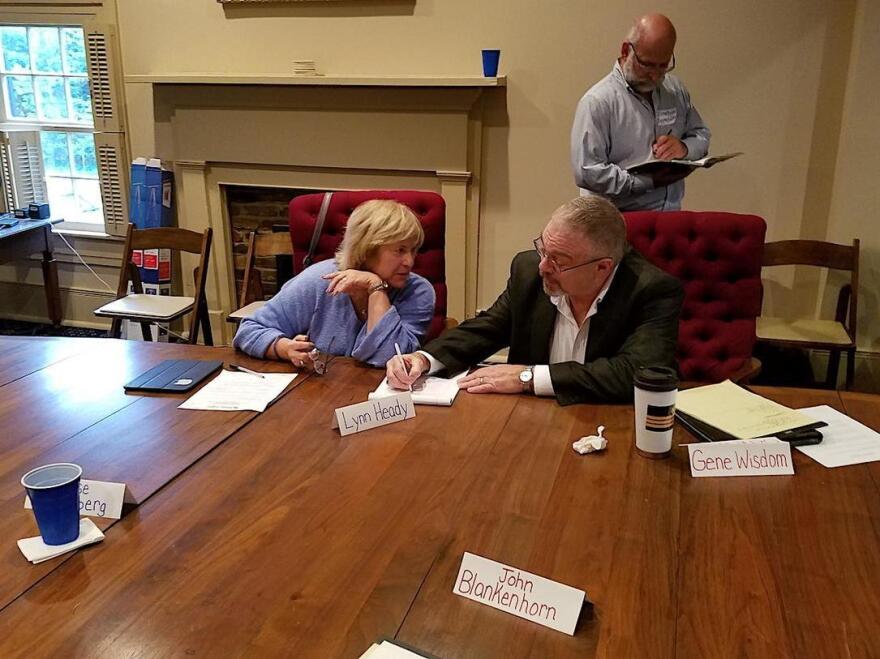In the rough-hewn parlor of a creaky, 19th-century farmhouse in Brentwood, 13 people are sitting in a pair of concentric circles.
Six "reds" — or conservatives — are in the middle.
Around them on the outside, sit seven "blues" — or liberals.
"Don't look at them. Don't talk to them. We'll just talk among ourselves," commands Bill Doherty, a family therapist who teaches at the University of Minnesota. "Those of you who are in the blue group, your job is to listen and learn something here."
Doherty challenges the red group to name some of the things about their fellow conservatives that bother them.
"Uh, OK then, I'll throw out a name," says one man. "Trump. The populist side doesn't necessarily equate to conservatism."
Over the next 10 minutes, they list the various factions within the conservative movement that bug them: anti-government radicals, people who are religiously intolerant, and media that seem slavish to the president.
The left-leaning blues in the outer ring silently take notes.
There's no question the country's political gaps are widening. Increasingly, Americans socialize with, worship alongside and even date only people who share their ideology.
Figuring out how to talk across this divide is hard. But there's one group of professionals that has a long history helping people find common ground — marriage and family therapists.
Healing divisions
This exercise is called a fishbowl. It's been used in group therapy sessions for decades.
"What happens is, people in the middle forget about the other group," Doherty explains. "They're just talking to each other. And so it's a chance to kind of eavesdrop on a group that you'd never have a chance to do before, and then you get some things from that that you can't get any other way."
The fishbowl is one part of a day-long workshop. Participants also discuss stereotypes — both of themselves and of the other side — and they engage in question-and-answer sessions.
All of these exercises are drawn from Doherty's experience as a counselor. They're meant to heal divisions within a family or other social group.
This workshop applies them to the political divide.
"These are not mostly purples," says Doherty. "These are reds and blues. But they are willing to listen, and what I believe is that a lot of Americans are willing to listen."

Doherty has been running these workshops since late last year — just a few weeks after the election — on behalf of a program called Better Angels.
The organization's name refers to a line in President Abraham Lincoln's First Inaugural Address — the voice of conscience that prizes unity over division. It was delivered less than six weeks before the outbreak of the Civil War, another time when Americans were deeply divided.
Better Angels hopes to bridge this era's political chasm.
"Just about every issue you can think of — not just a few, but every issue — is just gridlocked," says David Blankenhorn, the organization's president and founder. "We don't even agree on our ability to talk to each other any more."
19th-century approach
Better Angels holds itself out as a political movement in the making. It's held 40 workshops so far across the Midwest, the Northeast and the South, and it draws inspiration from the Farmer's Alliance, which began at the grassroots in the 1800s and eventually became a third party, the Populists. The Alliance faded away shortly after the turn of the 20th century, but only after shaking up the political landscape.
Similarly, Better Angels wants to change the way politics is conducted today.
"We'd ultimately like to bring together political leaders and everybody else," says Blankenhorn. "But beginning at the level of just citizen-to-citizen, can we talk to one another? ... Can we at least recognize the goodwill of the other side?"
But organizers admit, one of the biggest challenges they face is selection bias. Participants have to want to hear the other side, and although the workshops are free of charge, they have the means to spend a day getting it.
The group meeting that met in Brentwood on a recent Saturday was overwhelmingly white, Judeo-Christian and middle class. They're not tasked with finding issues they agree on, but through the discussions, it nonetheless emerges that many share some common views, on topics like opposing welfare fraud and supporting some level of immigration.
Even one of the participants, Brentwood resident Beth Malow, wonders whether she's truly hearing the other side. She describes herself as a moderate, fiscally conservative Democrat.
"For me, that was really understanding somebody who, let's say, voted for Donald Trump, and what it was that motivated him. Was it wanting change?"
But none of the conservatives who attended Malow's workshop were ardent Trump supporters. Several from the red group confess they didn't even vote for him; those that did, generally aren't happy with his performance.
Still, Malow says the conversation has widened understanding of what people mean when they call themselves "conservatives."

"One thing we don't want to do is consider ourselves to be uni-dimensional. People are multidimensional. People have many different sides."
Another person who's on hand is Greg Smith. Despite an ailing back, he's driven all the way from southwestern Ohio to sit in as an observer. In the spring, Smith took part in one of the first red/blue workshops.
"I was what one might consider a real hardcore conservative," he recalls. "And just kind of immovable."
But through Better Angels, Smith met a Muslim man who also lives in southwestern Ohio. Smith says they've become friends, meeting for lunch and even going to a service at his Pentecostal church. Soon they plan to visit a mosque.
"It's been an eye-opener. I've actually changed my viewpoint of some people, even President Obama," he says. "I've changed the way I've looked at some things."
Smith is now training to becoming a Better Angels moderator.
He wants to learn how to lead these conversations in his community.
Copyright 2017 WPLN News




